AMD Zen 3 Ryzen Deep Dive Review: 5950X, 5900X, 5800X and 5600X Tested
by Dr. Ian Cutress on November 5, 2020 9:01 AM ESTGaming Tests: World of Tanks
Albeit different to most of the other commonly played MMO or massively multiplayer online games, World of Tanks is set in the mid-20th century and allows players to take control of a range of military based armored vehicles. World of Tanks (WoT) is developed and published by Wargaming who are based in Belarus, with the game’s soundtrack being primarily composed by Belarusian composer Sergey Khmelevsky. The game offers multiple entry points including a free-to-play element as well as allowing players to pay a fee to open up more features. One of the most interesting things about this tank based MMO is that it achieved eSports status when it debuted at the World Cyber Games back in 2012.
World of Tanks enCore is a demo application for its new graphics engine penned by the Wargaming development team. Over time the new core engine has been implemented into the full game upgrading the games visuals with key elements such as improved water, flora, shadows, lighting as well as other objects such as buildings. The World of Tanks enCore demo app not only offers up insight into the impending game engine changes, but allows users to check system performance to see if the new engine runs optimally on their system. There is technically a Ray Tracing version of the enCore benchmark now available, however because it can’t be deployed standalone without the installer, we decided against using it. If that gets fixed, then we can look into it.
The benchmark tool comes with a number of presets:
- 768p Minimum, 1080p Standard, 1080p Max, 4K Max (not a preset)
The odd one out is the 4K Max preset, because the benchmark doesn’t automatically have a 4K option – to get this we edit the acceptable resolutions ini file, and then we can select 4K. The benchmark outputs its own results file, with frame times, making it very easy to parse the data needed for average and percentiles.
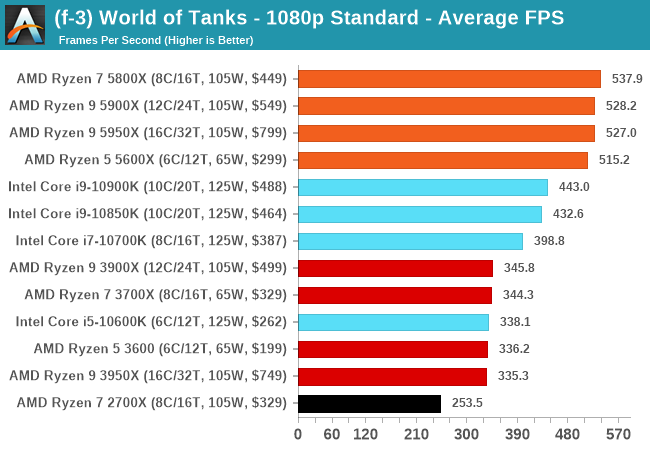
| AnandTech | Low Resolution Low Quality |
Medium Resolution Low Quality |
High Resolution Low Quality |
Medium Resolution Max Quality |
| Average FPS | 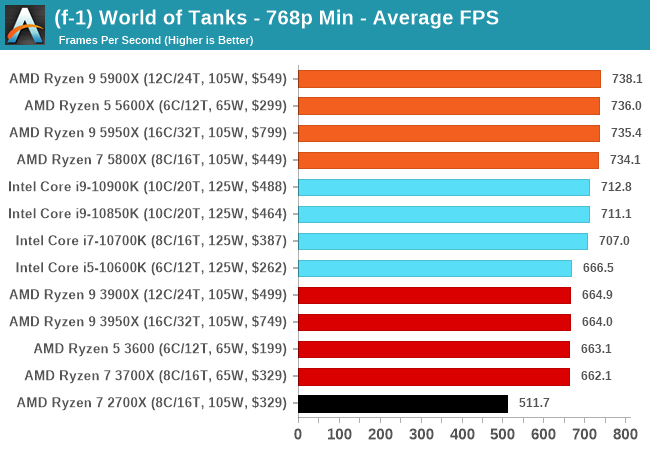 |
 |
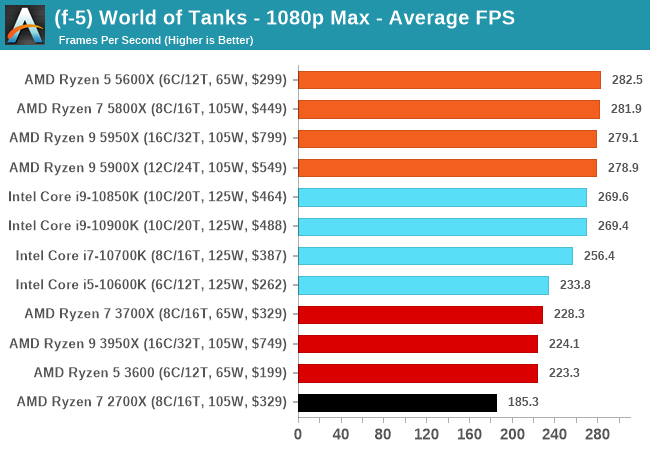 |
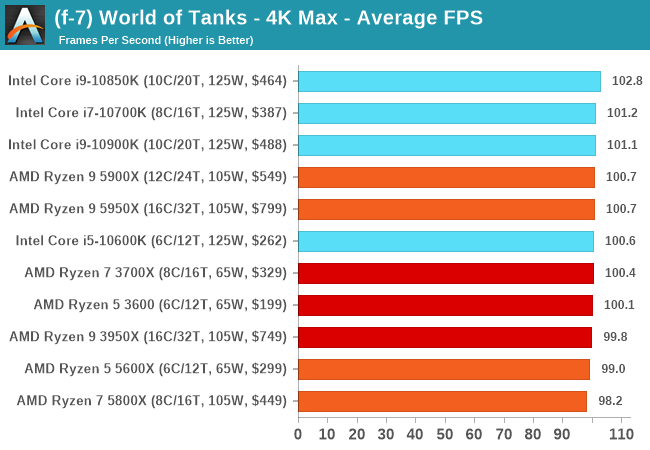 |
| 95th Percentile | 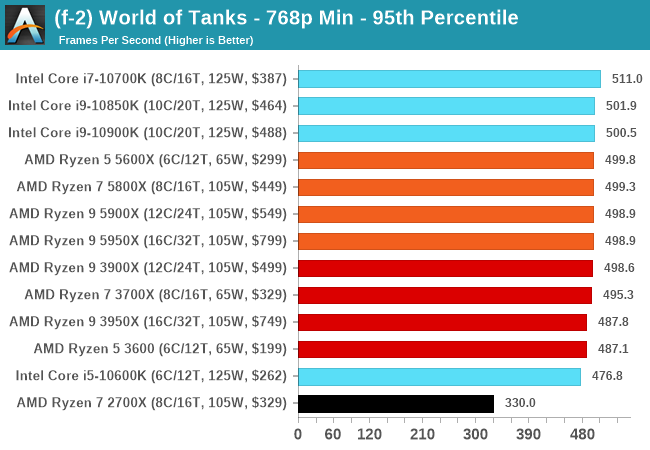 |
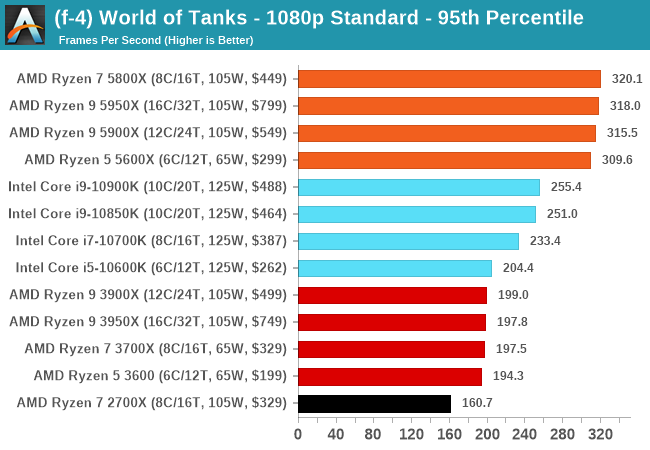 |
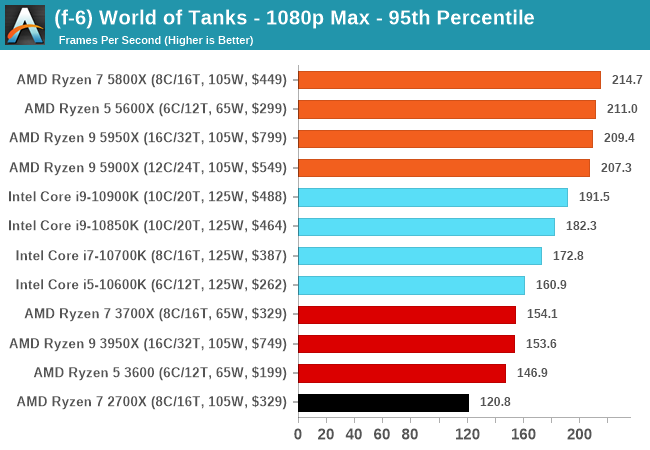 |
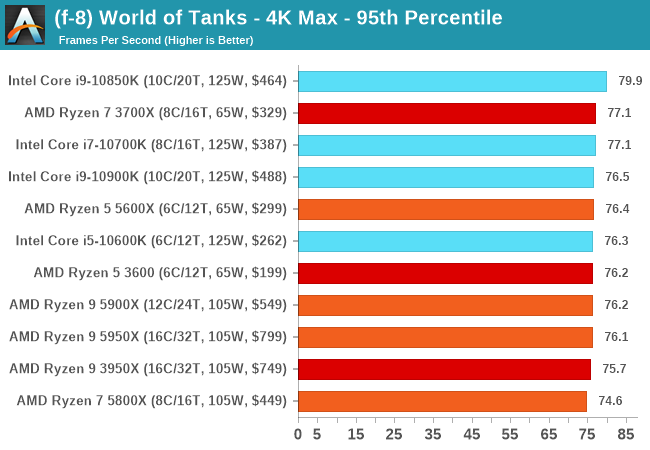 |
All of our benchmark results can also be found in our benchmark engine, Bench.


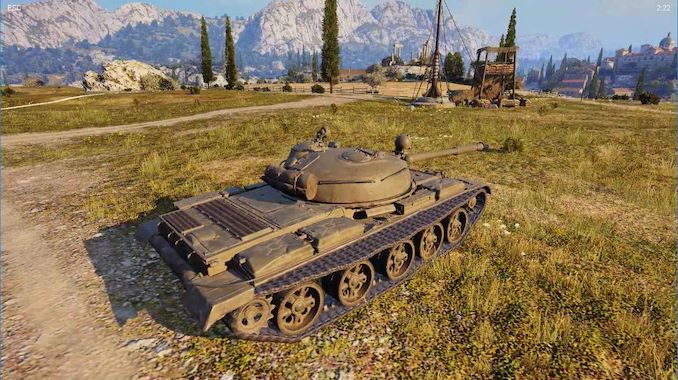








339 Comments
View All Comments
Luminar - Thursday, November 5, 2020 - link
Cache Rules Everything Around MeSIDtech - Thursday, November 5, 2020 - link
Hi Andrei,Excellent work. Do you know how this performance shapes up against the Cortex A77 ?
t.s - Friday, November 6, 2020 - link
Seconded. Want to know how the likes of ryzen 4 4350G or 5600 versus Cortex A77 or A78.Kangal - Saturday, November 7, 2020 - link
It's hard to say, because it really depends on the instruction/software as it is very situational. It also depends on the type of device it is powering, you can move up from Phones, to Thin Tablets, to Thick Laptops, to Large Desktops, and upto a Server. Each device offers different thermal constraints.The lower-thermal devices will favour the ARM chip, the mid-level will favour AMD, and the higher-thermal devices will favour Intel. That WAS the rule of thumb. In general, you could say Intel's SkyLake has the single-threaded performance crown, then AMD's Zen+ loses to it by a notable margin but beats it in multi-threaded tasks, and then going to an ARM Cortex A76 will have the lowest single-thread but the highest multi-threaded performance.
Now?
Well, there's the newly launched 2021 AMD Zen3 processor. And the upcoming 2021 ARM Cortex-X Overclocked Big-core using the new A78 microarchitecture. Lastly there's the 2022 Intel Rocket Lake yet to debut. So it's too early to tell, we can only make inferences.
Kangal - Saturday, November 7, 2020 - link
Here is my personal (yet amateur) take on the future 2020-2022 standpoints between the three racers. Firstly I'll explain what the different keywords and attributes mean(from most technical to most real-world implication)
Total efficiency: (think Full Server / Tractor) how much total calculations versus total power draw
Multi-threaded: (think Large Desktop / Truck) how much total calculations
Single-threaded: (think Thick Laptop / Car) how much priority calculations
IPC performance: (think Thin Tablet / Motorbike) how much priority calculations at desirable frequency/voltage/power-draw
*Emulating:
Having a "simple" ARM chip running "complex" x86 instructions. Such as running 32bit or 64bit OS X or Windows programs, via new techniques of emulation using a partial-hardware and hybrid-software solutions. I think the hit to efficiency will be around x3, instead of the expected x12 degradation.
So here are the lists (from most technical to most real-world implication)
Simple Code > Mixed code > Recommended Solution
Here's how they stack up when running identical new code (ie Modern Apps):
Total efficiency: ARM >>>> AMD >> Intel
Multi-threaded: ARM > AMD > Intel
Single-threaded: Intel = AMD > ARM
IPC performance: ARM >>> AMD > Intel
Now what about them running legacy code (ie x86 Program):
Efficiency + *emulating: AMD > Intel >> ARM
Multi + *emulating: AMD > Intel >> ARM
1n + *emulating: Intel = AMD >>> ARM
IPC + *emulating: AMD > Intel > ARM
My recommendation?
Full Server: 60% legacy 40% new code. This makes ARM the best option by a small margin.
Large Desktop: 80% legacy 20% new code. AMD is the best option with modest margin.
Thick Laptop: 70% legacy 30% new code. Intel is the best. AMD is very close (tied?) second.
Thin Tablet: 10% legacy 90% new code. ARM is the best option by huge margin.
Tomatotech - Monday, November 9, 2020 - link
Excellent post, but worth pointing out that *all* modern chips now emulate x86 and x64 code. They run a front end that takes x86 / x64 machine code then convert that into RISC code and that goes through various microcode and translation layers before being processed by the backend. That black box structure has allowed swapping out and optimising the back end for decades while maintaining code compatibility on the front end.So it’s not as simple to differentiate between the various chips as you make it out to be.
Gondalf - Sunday, November 8, 2020 - link
I don't know. Looking Spec results, we can say Anandtech is absolutely unable to set a Spec session correctly. From the review Zen 2 is slower per Ghz than old Skylake in integer, that is absolutely wrong in consumer cores (in server cores yes), even worse Ice Lake core is around fast as old Skylake per GHz.Basically this review is rushed and very likely they have set all AMD compiler flags on "fast" to do more contacts and a lot of hipe.
My God, for Anandtech Zen 3 is 35% faster in the global Spec values than Zen 2. Not even AMD worst marketing slide say this. We have Zen 4 here not Zen 3. Wait wait please.
A really crap review, the author need to go back to school about Spec.
Obviously the article do not say that 28W Tiger Lake is unable to run at 4.8Ghz for more than a couple of seconds, after this it throttes down, so the same Willow Cove core on a desktop Cpu could destroy Zen 3 without mercy on a CB session. Not to mention the far slower memory subsystem of a mobile cpu.
Basically looking at games results, Rocket Lake will eclipse this core forever. AMD have nothing of new in its hands, they need to wait Zen 4
Qasar - Sunday, November 8, 2020 - link
yea ok gondalf, trying to find ways that your beloved intel doesnt lose at everything now ??accept it, amd is faster then intel across the board.
Spunjji - Monday, November 9, 2020 - link
That's a strange claim about Tiger Lake performance, Gondalf, because I seem to recall Intel seeding all the reviewers with a laptop that could run TGL at 4.8Ghz boost 'til the cows come home - and that's what Anandtech used to get that number. It's literally the best they can do right now. You're right of course - in actual shipping ultrabooks, TGL is a hot PoS that cannot maintain its boost clocks. Maybe by 2022 they'll finally put Willow Cove into a shipping desktop CPU."Basically looking at games results, Rocket Lake will eclipse this core forever"
If by "eclipse" you mean gain a maximum 5% advantage at higher clock speeds and nearly double the power draw then sure, "eclipse", yeah. 🤭
I love your posts here. Please, never stop stepping on rakes like Sideshow Bob.
macroboy - Saturday, December 12, 2020 - link
LOL look at AMD's Efficiency and sustained core clocks, Intel runs too hot to stay at 5ghz for very long. meanwhile Zen3 plows along at 55C no problem, *you're the one who needs to check your facts.